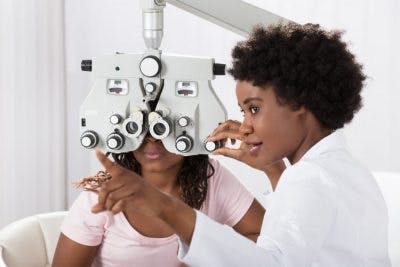Funny She Hit Her in the Eye Back of Head
Blurred vision in one eye may occur after a head injury. There are several possible causes of blurred vision, some more serious than others.
This article explains why you might have blurred vision in one or both eyes after a head injury and how to heal.
Causes of Blurred Vision in One Eye After Head Injury
There are multiple factors that may trigger blurred vision in one eye after a head injury. One of the most common is a condition known asaccommodative dysfunction.
In normal vision, the eyes can switch their focus from near objects to far, and vice versa. This process is known as "accommodation" and allows objects to look clear when you focus on them.
sometimes, however, this function is affected. For example, most people tend to lose their ability to switch focus in their 40's, and they develop farsightedness or nearsightedness. This may also occur after a head injury.
If a head injury damages the eye itself or the nerves responsible for controlling eye muscles, the eye may lose its ability to focus. As a result, blurred vision occurs in one or both eyes.
Other Reasons for Blurry Eyesight
There are other factors that may cause blurred vision after hitting your head, including:
- Dry eye. A concussion may damage a person's blink response. If the eye becomes too dry, blurred vision may result.
- Ocular migraines. Migraines are frequent after a head injury. Some migraines are accompanied by vision problems such as blurred vision or flickering lights.
- Detached retina. After a head injury, the retina may tear away from the back of your eye and lose its blood supply. If that occurs, your vision in one eye will become blurred. Detached retinas may cause permanent vision loss if left untreated.
- High blood sugar. High blood sugar levels, which are common in diabetes patients, may cause the lens of your eye to swell, which results in blurred vision.
- Stroke. Finally, sudden blurred vision or vision loss in one eye may be a sign of a stroke occurring in your eye. Since head injury increases a person's risk of stroke, it's important for patients to be aware of this risk factor.
Some of these causes are minor, such as dry eye. Others, however, such as a stroke or a detached retina, require immediate treatment.
But how can you tell whether sudden blurred vision in one eye is an emergency situation? Below are some guidelines to assist you in making decisions about appropriate medical care.
When is Blurred Vision in One Eye an Emergency?
The following signs could indicate a serious eye condition that requires emergency treatment.
- Sudden eye pain.
- Eye injury, such as broken blood vessels.
- Signs of stroke, such as facial drooping, weakness on one side, or slurred speech.
- Loss of one area of your vision, also known as visual field loss.
If you have any of these symptoms, go to the ER for an immediate evaluation. Contact your optometrist as soon as you experience blurred vision in one eye after a head injury.
While it may not be an emergency, it is still a good idea to have your eye examined by a professional. The sooner you can receive treatment, the more likely you are to preserve your eye function.
Symptoms that Accompany Vision Problems After Head Injury
Besides blurred vision in one eye, there are several other eye symptoms that often accompany a head injury. These include:
- Light sensitivity
- Headache
- Redness in eyes
- Double vision
- Floating spots in your vision, also known as floaters
Sometimes these issues may make blurred vision worse. Therefore, it's important to address them during treatment as well.
For instance, floaters are microscopic fibers within the eye that tend to increase with age. However, if you notice a sudden increase in floaters after your head injury, that could be a sign of retinal detachment. It is crucial to get your eye examined by a doctor as soon as you notice changes in your vision.
How to Treat Blurry Vision in One Eye After Head Injury

Treatment for blurred vision in one eye after a head injury will depend on the symptom of the vision problem. For example, if a detached retina is the cause of your sudden blurred vision, doctors may need to operate on your eye to repair the retina.
If your blurred vision is caused by accommodative dysfunction, vision therapy exercises may help.
Vision therapy strengthens the eye muscles that focus on objects. By strengthening these muscles, you train your eye to switch focus again. This may reduce blurred vision.
Click here to learn more about eye exercises for head injury patients »
Finally, treating your blurred vision after a head injury may be as simple as using corrective lenses or contacts. Sometimes eye drops may resolve blurred vision.
Consult an optometrist as soon as blurred vision occurs. Your optometrist may suggest the most effective treatment options for you as well as determine whether you require surgery or not.
Blurred Vision After Hitting Head: Key Points
Blurred vision in one eye can occur for a variety of reasons, some of them quite serious.
If you experience sudden blurred vision in your eye after a head injury, call your doctor right away. It is possible that you have a detached retina, which requires immediate treatment.
Even if you do not have a detached retina, an eye doctor can point you towards the best treatment approach to address your blurred vision. Some approaches, such as vision therapy, are noninvasive and may strengthen your eye muscles.
Prompt treatment of blurred vision after a head injury is the best way to ensure a positive outcome and preserve your eye function. Good luck!
Source: https://www.flintrehab.com/head-injury-blurred-vision-in-one-eye/
0 Response to "Funny She Hit Her in the Eye Back of Head"
Post a Comment